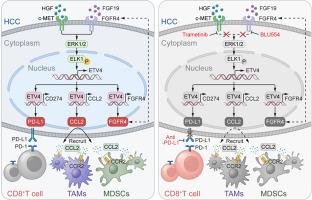Journal of Hepatology ( IF 26.8 ) Pub Date : 2023-03-11 , DOI: 10.1016/j.jhep.2023.02.036 Meng Xie , Zhuoying Lin , Xiaoyu Ji , Xiangyuan Luo , Zerui Zhang , Mengyu Sun , Xiaoping Chen , Bixiang Zhang , Huifang Liang , Danfei Liu , Yangyang Feng , Yijun Wang , Yiwei Li , Bifeng Liu , Wenjie Huang , Limin Xia

|
Background & Aims
Metastasis remains the major reason for the high mortality of patients with hepatocellular carcinoma (HCC). This study was designed to investigate the role of E-twenty-six-specific sequence variant 4 (ETV4) in promoting HCC metastasis and to explore a new combination therapy strategy for ETV4-mediated HCC metastasis.
Methods
PLC/PRF/5, MHCC97H, Hepa1-6, and H22 cells were used to establish orthotopic HCC models. Clodronate liposomes were used to clear macrophages in C57BL/6 mice. Gr-1 monoclonal antibody was used to clear myeloid-derived suppressor cells (MDSCs) in C57BL/6 mice. Flow cytometry and immunofluorescence were used to detect the changes of key immune cells in the tumour microenvironment.
Results
ETV4 expression was positively related to higher tumour–node–metastasis (TNM) stage, poor tumour differentiation, microvascular invasion, and poor prognosis in human HCC. Overexpression of ETV4 in HCC cells transactivated PD-L1 and CCL2 expression, which increased tumour-associated macrophage (TAM) and MDSC infiltration and inhibited CD8+ T-cell accumulation. Knockdown of CCL2 by lentivirus or CCR2 inhibitor CCX872 treatment impaired ETV4-induced TAM and MDSC infiltration and HCC metastasis. Furthermore, FGF19/FGFR4 and HGF/c-MET jointly upregulated ETV4 expression through the ERK1/2 pathway. Additionally, ETV4 upregulated FGFR4 expression, and downregulation of FGFR4 decreased ETV4-enhanced HCC metastasis, which created a FGF19–ETV4–FGFR4 positive feedback loop. Finally, anti-PD-L1 combined with FGFR4 inhibitor BLU-554 or MAPK inhibitor trametinib prominently inhibited FGF19–ETV4 signalling-induced HCC metastasis.
Conclusions
ETV4 is a prognostic biomarker, and anti-PD-L1 combined with FGFR4 inhibitor BLU-554 or MAPK inhibitor trametinib may be effective strategies to inhibit HCC metastasis.
Impact and implications
Here, we reported that ETV4 increased PD-L1 and chemokine CCL2 expression in HCC cells, which resulted in TAM and MDSC accumulation and CD8+ T-cell inhibition to facilitate HCC metastasis. More importantly, we found that anti-PD-L1 combined with FGFR4 inhibitor BLU-554 or MAPK inhibitor trametinib markedly inhibited FGF19–ETV4 signalling-mediated HCC metastasis. This preclinical study will provide a theoretical basis for the development of new combination immunotherapy strategies for patients with HCC.
中文翻译:

FGF19/FGFR4介导的ETV4升高通过上调PD-L1和CCL2促进肝细胞癌转移
背景与目标
转移仍然是肝细胞癌(HCC)患者高死亡率的主要原因。本研究旨在探讨E-26特异性序列变体4(ETV4)在促进HCC转移中的作用,并探索ETV4介导的HCC转移的新联合治疗策略。
方法
PLC/PRF/5、MHCC97H、Hepa1-6和H22细胞用于建立原位HCC模型。使用氯膦酸盐脂质体清除 C57BL/6 小鼠的巨噬细胞。Gr-1 单克隆抗体用于清除 C57BL/6 小鼠中的骨髓源性抑制细胞 (MDSC)。采用流式细胞术和免疫荧光检测肿瘤微环境中关键免疫细胞的变化。
结果
ETV4表达与人类HCC中较高的肿瘤-淋巴结-转移(TNM)分期、较差的肿瘤分化、微血管侵犯和不良预后呈正相关。HCC 细胞中 ETV4 的过度表达可反式激活 PD-L1 和 CCL2 表达,从而增加肿瘤相关巨噬细胞 (TAM) 和 MDSC 浸润并抑制 CD8 +T 细胞积累。慢病毒或 CCR2 抑制剂 CCX872 治疗敲低 CCL2 会损害 ETV4 诱导的 TAM 和 MDSC 浸润和 HCC 转移。此外,FGF19/FGFR4和HGF/c-MET通过ERK1/2途径共同上调ETV4表达。此外,ETV4上调FGFR4表达,下调FGFR4可减少ETV4增强的HCC转移,从而形成FGF19-ETV4-FGFR4正反馈回路。最后,抗PD-L1联合FGFR4抑制剂BLU-554或MAPK抑制剂曲美替尼显着抑制FGF19-ETV4信号诱导的HCC转移。
结论
ETV4是一种预后生物标志物,抗PD-L1联合FGFR4抑制剂BLU-554或MAPK抑制剂曲美替尼可能是抑制HCC转移的有效策略。
影响和影响
在此,我们报道 ETV4 增加 HCC 细胞中 PD-L1 和趋化因子 CCL2 的表达,从而导致 TAM 和 MDSC 积累以及 CD8 + T 细胞抑制,从而促进 HCC 转移。更重要的是,我们发现抗PD-L1联合FGFR4抑制剂BLU-554或MAPK抑制剂曲美替尼显着抑制FGF19-ETV4信号介导的HCC转移。这项临床前研究将为HCC患者开发新的联合免疫治疗策略提供理论基础。


















































 京公网安备 11010802027423号
京公网安备 11010802027423号